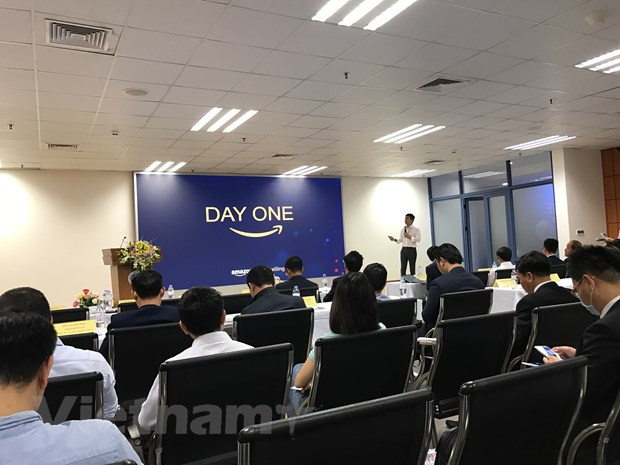 A representative from the Vietnam e-Commerce and Digital Economy Agency addresses the conference (Photo: VietnamPlus)
A representative from the Vietnam e-Commerce and Digital Economy Agency addresses the conference (Photo: VietnamPlus)Hanoi (VNA) – As information technology booms, investment into e-commerce will be key to businesses’ growth, held experts.
Leading experts in e-commerce gathered at a conference in Hanoi on November 27 to discuss measures to promote startups in innovation and digital transformation on the foundation of e-commerce.
They noted that e-commerce has changed shopping and trading activities considerably. This has been evident throughout the COVID-19 pandemic. While almost all direct transactions were suspended, e-commerce continued, helping businesses reach international customers, increase revenue and speed up the marketing process at an economical cost.
Expanding scale
Statistics from the Vietnam e-Commerce and Digital Economy Agency under the Ministry of Industry and Trade, the scale of Business-to-Customer (B2C) e-commerce market in Vietnam, including revenue of goods and services sold via e-commerce channels, has increased consecutively in the last five years.
In 2015, the number of people shopping online was about 30.3 million, which rose to 44.8 million in 2019.
Furthermore, the value of goods bought online by each customer increased from 160 USD in 2015 to 225 USD in 2019.
Seeing this rapid growth, Ngo Hoang Gia Khanh, Deputy General Director for Business Development of Tiki said that currently, enterprises have an abundance of opportunity to become successful in e-commerce platforms.
Businesses may not spend a penny on construction and operation, while saving marketing cost thanks to the direct approach to customers, reducing the spending on human resources and increasing service quality, he said. He added that e-commerce platforms also provide tools to help companies manage stockpiles and supply goods in a flexible manner.
Tran Xuan Thuy, Director of Global Selling Amazon Vietnam said that this year, e-commerce growth is likely to be higher than traditional channels by six times.
Amid the pandemic, online selling is the safest channel for customers to buy essential goods, he said, adding that the transition of direct shopping to online shopping will continue to develop in the long term.
A recent report by the World Trade Organisation asserted that the COVID-19 pandemic has proved that e-commerce is not only a tool or solution for consumers in the crisis period, but also an economic motivation facilitating domestic and international trade, thus contributing to the support of small and medium enterprises.
Despite the impact COVID-19 has had on the global economy and trade, e-commerce revenue in Vietnam in 2020 still expanded by double digits, said Nguyen Thuy Anh, head of the digital economy research office under the Vietnam e-Commerce and Digital Economy Agency.
Grasping the opportunity for success
Trinh Hoang Linh, Managing Director of iExport under Procom Vietnam company, cited a survey showing that more than 70 percent of small and medium-sized enterprises (SME) in Vietnam have yet to build their own e-commerce channel, especially for international trading.
The reason was their weak branding and modest knowledge of e-commerce, he said, adding that many other firms face difficulties in applying e-commerce due to their lack of experience.
In order to solve these problems, Nguyen The Quang, Vice Director of the Vietnam e-Commerce and Digital Economy Agency said that, thanks to BigData and Internet of Things technologies, businesses can analyse the activities of consumers in all markets, which supports them in improving their products to customers’ demand and building strategy to take care of customers and conduct marketing at a low cost.
“The opportunity is equal, but success is not for all. Startup businesses can grasp the opportunities today to get more success in the future,” said Quang.
In 2020, Vietnam and the world have faced opportunities and challenges brought about by global developments, including the impact of the COVID-19 pandemic, proving the role of digitalisation on the foundation of e-commerce.
In the national master plan on e-commerce development in the 2021-2025 period, which has been approved by the Prime Minister, e-commerce is highlighted as one of the pioneering areas of the digital economy, which helps businesses enhance their competitiveness.
The Government expects that in 2025, B2C e-commerce will expand 25 percent to 35 billion USD, accounting for 10 percent of the country’s total retail of goods and services.
An MoIT representative said that the Government has defined e-commerce as the venue for advanced technology of the Fourth Industrial Revolution to be applied widely to enhance the efficiency of business and production activities./.





























